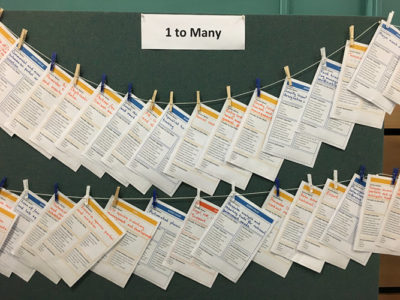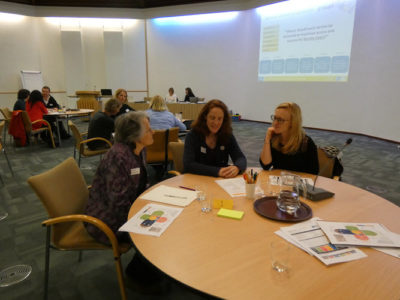The SBIF Review: workshop on service provision options, 17th & 18th October 2017

The second in our series of four workshops that will identify and evaluate different scenarios for the re-design of the biological recording infrastructure in Scotland was held on the 17th and 18th October, at Scottish Natural Heritage’s Battleby Conference Centre near Perth. This workshop followed the success of Workshop 1 in September, which created and proposed a new data flow model for the infrastructure.
In this workshop twenty-five attendees (including the four organisers) were invited to re-imagine our service model for maximum value and fundability, with the principal task being the creation of a service catalogue for the infrastructure.
Working together in different groups that changed with each session of the workshop, the attendees evaluated and expanded a draft list of services. We examined the value and effort of providing each service in different ways, deconstructing and grouping them in different ways. Services were classified in turn by: whether they should be considered ‘core’ or ‘added-value’; their applicability to each stage of the NBN / SBIF Data Flow Pathway (record & collect, verify, curate, aggregate, analyse and share); the ratio of provider to user that would be most suitable for delivery (1:1, 1:Many, Many:1, or Many:Many); and the scale of delivery (central, national, regional or local).
Before undertaking the principal task, the workshop attendees were guided through some of the results of the questionnaire and interviews that had been conducted earlier this year, along with the outputs from Workshop 1. The drivers for change to the current infrastructure were also reviewed, as were the design principles for a service catalogue.
Some important messages from this workshop were:
- The minimum scale of delivery is regional owing to the need to obtain both economies of scale and local value
- Every service needs an online presence
- Most external services are ‘1:Many’ ie 1 provider to many users
- An ‘automated planning screening service’ is needed at a national level, while ‘enhanced interpretation services’ would be higher value at a regional level
By the end of the workshop a service catalogue had started to emerge, which together with the proposed data flow model that was created at Workshop 1, provides an outline description of our ideal biological recording infrastructure and the services that could be delivered.
The outputs from this workshop are still being written up but they will be sent out to all the attendees as soon as they are ready. They will also be made available on the SBIF Review pages of the NBN website. The outputs from Workshop 1 are already available for download from this page.
Thanks to everyone who attended and participated in the workshop. Thanks also to Liz Edwards and Rachel Stroud for creating and facilitating the workshops, and to Ellen Wilson for her planning and preparation of the materials. Thanks also to SNH for hosting the event and to RSPB for funding the catering.
The next workshops and their topics are:
- 9th/10th November: Governance
- 4th/5th December: Funding
Each workshop has a full complement of attendees but we are running a reserve list for each in case a vacancy arises. If you are interested in being added to the reserve list please email Christine Johnston, NBN Scottish Liaison Officer.

